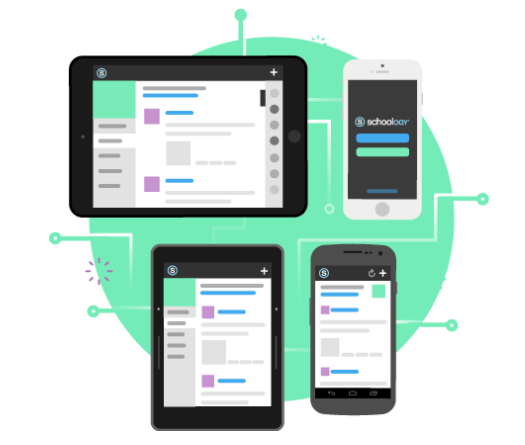Despite all of the educational technology advancements of the past decade, the connection between in-class learning and assessments remains blurry. With state standards changing by the school year in some cases, it takes a lot of work to know WHAT to teach – and even more work to make sure that knowledge is expressed by students on the assessments. Aligning lesson plans with state standards takes some strategizing, even if the teacher is well aware of the requirements. All of that takes time – a lot of it – and teachers already work an average of nearly 55 hours per week, according to a Scholastic study.
Technology has the power to shrink that workload though and there are already some edtech companies ahead of the curve.
I’ve was recently able to demo Schoology, a learning management system that enables teachers with the tools to create learning content, organize lesson plans, communicate with students, collaborate with other teachers/administrators/parents, and manage the entire learning process. This all happens from a browser-based system that teachers can access anywhere with their login credentials. Schoology has third-party integration tools, too, so teachers don’t have to create their own lesson content in a vacuum.

Schoology is available at the K-12, college, and corporate levels. The platform’s implications for K-12 teachers, however, are what impressed me most. Generally speaking, the level of involvement in an individual’s education gets smaller as that person gets older. In Kindergarten, parents, teachers, administrators and other caregivers are heavily involved in the education of their young students (or should be, at least). By high school, that involvement is still existent but in less hands-on ways. College and continuing education for careers usually just involve the student and his or her determination to succeed.
K-12 teachers, then, should have the most collaboration tools at their disposal. That’s not the case, though, as K-12 educators know all too well. Schoology is the first learning management and assessment management system I’ve seen that streamlines the “whole picture” of what teachers do and need for their students to succeed. It helps that the platform is incredibly easy to use and is accessible from anywhere with an internet or data-plan connection. 
Schoology allows:
- Connection between all school members, even after the school day ends.
- District wide collaboration
- Global connection between educators using the Schoology platform
- Integration with the systems already in place at your school
- A mobile app available on any iOS, Android or Kindle device
- Analytics and performance tracking that boosts decision-making power

Schoology is a one-stop platform for planning, teaching, collaborating, analyzing, and even testing.
Connecting to Assessments
Schoology takes its learning management system a step further than other platforms with its Assessment Management Platform. Essentially, Schoology employs an assessment engine that curates learning content and makes it available for assessment-building by teachers. It’s not just teachers, though. Districts can create and assign assessments within the system too, and deliver them in several language options.
There’s a lot of variety in the type of assessments educators deliver, from weekly quizzes to end-of-year exams. Schoology’s AMP addresses it all, each larger assessment unit building on the smaller one before it. It’s especially effective for district-wide required testing, as Cherry Creek Schools near Denver learned with its annual Algebra I assessment. I interviewed Cherry Creek’s District Instructional Technology Coordinator Kellie Ady for an Education Week piece and asked her specifically about the difference between the assessment pre-Schoology AMP, and post. Ady said that assigning work, testing students, and recording student progress/success was a cumbersome and disjointed process before Schoology. After participating in the beta program of Schoology, using just the Algebra I classes and assessments in the district, Ady said the process was much more streamlined. Teachers received immediate feedback and students were able to take the assessments in an interface that was comfortable and familiar.
“Moving forward, we will add more classes and assessments to the Schoology AMP. It just makes sense from an efficiency and effectiveness standpoint,” Ady said.
To learn more about Schoology’s learning management system and assessment management platform, head to Schoology’s K-12 features page.
